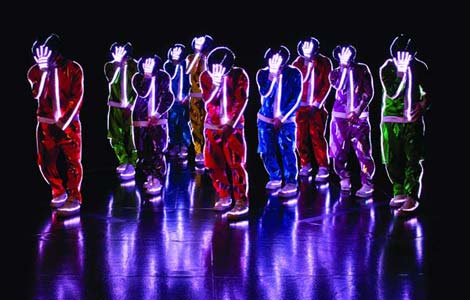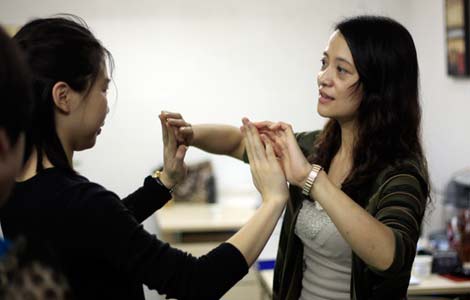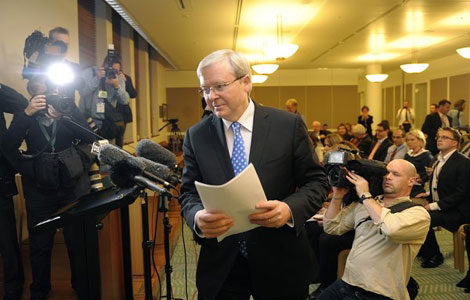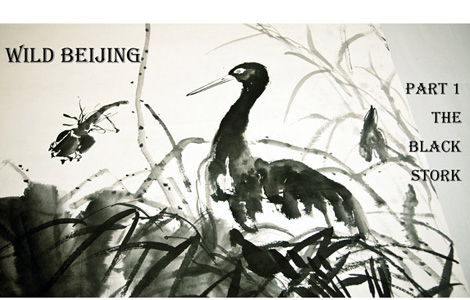Nation struggles to get accredited therapists
Updated: 2013-06-28 08:05
(China Daily)
|
||||||||
Dance has been a method of expression and physical exercise for centuries, but the establishment of dance as a therapy and as profession did not occur until the 1950s in the United States. It helped the country's people get out of the shadow of World War II and resume normal lives.
In the US and Europe, where dance therapy is well developed, professional organizations such as The American Dance Therapy Association and The Association for Dance Movement Psychotherapy in the United Kingdom set guidelines for the profession's education and offer credentials.
One has to complete strict training and pass grueling tests to acquire the credentials to become a dance therapist.
For example, in the US, to become a registered dance and movement therapist, or R-DMT, requires at least a master's degree with 700 hours of supervised clinical work. The requirement is 3,640 hours if one wants to become a board-certified dance and movement therapist. There are only six ADTA-approved master's programs in the US.
There are fewer than 10 ADTA registered professional dance therapists on the Chinese mainland, Hong Kong and Taiwan. In Taiwan, the profession is relatively better developed, with an association of dance therapists set up in 2002. But the mainland does not yet have an association nor a system of training and education to offer reliable accreditation.
Tony Zhou from Inspirees Institute of Creative Arts Therapy said the biggest challenge to dance therapy's development in China is the need to nurture qualified professionals.
"The market demand for professional dance therapists with internationally recognized credentials is much bigger than the number of such professionals in China. If some institutions are driven by profit to offer substandard service, it will harm the burgeoning industry," Zhou said.
"There will be many unexpected strong emotional breakouts during dance therapy. It is difficult for therapists to keep an emergency under control, which requires a lot of professional training."
Therapist Wang Yuchi in Guangzhou admits that she does not have credentials from an overseas association, even though she has put much more than 700 hours into the practice of dance therapy.
"I can't afford the time and money to pursue a master's degree and clinical work overseas. Actually, it's really difficult to get access to such education and job opportunities."
IICAT has developed a three-year professional dance therapy training program in accordance with ADTA guidelines and so far is the only institute in China that provides that level of training. Graduates from the program can apply for ADTA's R-DMT credential.
Zhou said that about 45 students are studying part time in IICAT's program in Beijing, Shanghai and Hong Kong.
"However," Wang said, "it will benefit the education and management of local dance therapists most by setting up China's own professional association".
- Xu Jingxi
(China Daily USA 06/28/2013 page5)

 Visit aids 'trust-building process'
Visit aids 'trust-building process'
 King of Pop returns
King of Pop returns
 Crowds cheer Court decision on gay marriage
Crowds cheer Court decision on gay marriage
 Hiring index signals further job weakness
Hiring index signals further job weakness
 Dance becomes popular stress relief
Dance becomes popular stress relief
 Philippine, US start Naval exercise in S China Sea
Philippine, US start Naval exercise in S China Sea
 Supreme Court gay rights ruling celebrated across US
Supreme Court gay rights ruling celebrated across US
 Rudd returns as Australian PM after Gillard
Rudd returns as Australian PM after Gillard
Most Viewed
Editor's Picks

|

|

|

|

|

|
Today's Top News
Senate OKs immigration reform; hurdles remain
Snowden could request asylum in Russia: official
US collects Internet data on citizens
Boston bombing suspect accused in 4 deaths
816 elected in provincial leadership reshuffle
US adds to DPRK sanctions list
Chinese pros put trust in blogs
More Americans see Snowden as patriot: Poll
US Weekly

|

|






